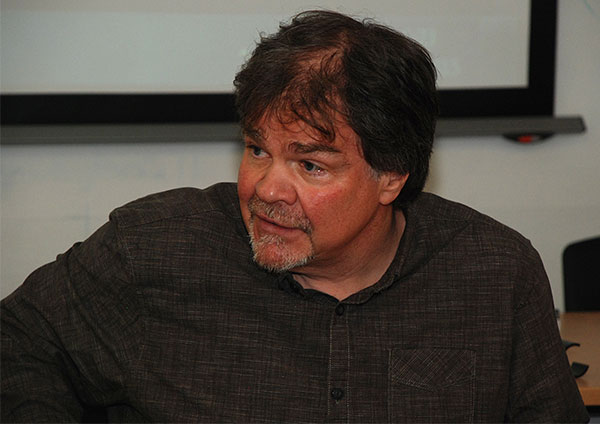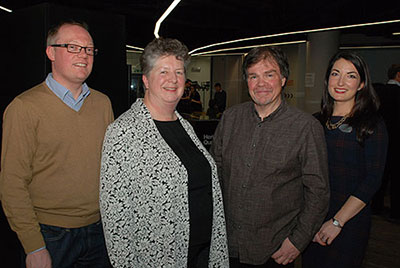Accent and dialect coach to the stars gives first Babel Lecture
 Brendan Gunn, accent and dialect coach to the stars, gives first Babel Lecture.
Brendan Gunn, accent and dialect coach to the stars, gives first Babel Lecture.
Tue, 17 Feb 2015 13:46:00 GMT
Brad Pitt, Cate Blanchett plus Game of Thrones are just a few of the clients of linguistics expert Brendan Gunn

Pictured at the first inaugural Babel lecture with accent and dialect coach Brendan Gunn (second right) are (left to right) Babel's editors Professor Dan McIntyre, and Professor Lesley Jeffries with assistant editor Dr Jane Lugea.
BRAD Pitt’s hardcore Irish dialect in “Snatch”…the contrasting English regional tones adopted by the feuding factions in “Game of Thrones”…the subtle blending of RP and Continental accents in films such as “The Illusionist”. These and many other dialogue strategies in major movies and TV shows have been devised and guided by Brendan Gunn and have stemmed from his background as an academic linguist.
He is an enthusiastic reader of Babel, the language magazine first published in 2012 that is co-edited by Professors Lesley Jeffries and Dan McIntyre with assistant editor Dr Jane Lugea, at the University of Huddersfield. When he gave the inaugural Babel Lecture – marking the publication’s tenth issue – Dr Gunn made frequent reference to key articles in the magazine, which has attracted contributions from many leading experts. At the conclusion of his lecture he described the magazine as “invigorating and comprehensive”.
The lecture took place at the University’s newly developed Heritage Quay archive centre and Dr Gunn began by going back to basics, showing that the origin of linguistics can be traced to the act of breathing. “It all starts from the upper respiratory tract.”
He conducted vocal exercises with the audience and demonstrated how codes of language could be used to underpin what he termed “conceits.” For example, the Ulster-Scots accent typified by Ian Paisley became a signifier of pro-British, pro-Protestant attitudes.
After establishing an academic and philosophical bedrock to his discipline, Dr Gunn went on to describe his work in film and TV. “My job is to get printed text into the mouths of actors,” he said, and it has many facets, in addition to dialect coaching. For example, when Cate Blanchett appeared as the crusading journalist Veronica Guerin, not only did the Australian actress have to master the Irish accent but also raise her voice to a much higher pitch. This meant that Dr Gunn – in addition to dialogue coaching, needed to conduct voice exercises so that no damage was done.
In the video Dr Gunn talks about his work as a film, television, theatre and corporate accent, dialect and dialogue coach to the rich and famous.
Showing a succession, of film clips, Dr Gunn described his work with actors such as Daniel Day-Lewis, who – as a method actor – continues to speak in his adopted dialect even when the cameras stop rolling. There have also been several projects with the versatile American actor Edward Norton – such as the refined RP (“received pronunciation”) that he deployed in “The Painted Veil”.
RP – which one actor believed meant “really posh” – tends to be used in films with historical settings, where an American accent would seem too modern. But there are dilemmas when an English-dialogue film has a non-English setting. Dr Gunn described his experiments with the use of RP tinged with some foreign vowel sounds, such as elements of Austrian-German speech patterns in “The Illusionist”. This was another conceit, requiring suspension of disbelief, he said.
Dr Gunn also had to work on a plausible dialect for a film with a prehistoric setting named “10,000 BC”. For this he used RP as the basis, but blended it with some Arabic sounds.
Working on the first series of TV’s “Game of Thrones”, Dr Gunn – realising that its fantasy world was derived from English history - used a Sheffield accent for the northerners and RP for the southern tribes. He also helped develop Dothraki , the invented language spoken by some of the characters.
Strict period pronunciation, in a film such as the controversial Shakespearian saga “Anonymous”, would hinder clarity in what was essentially a modern medium, said Dr Gunn. But sometimes clarity could deliberately be subverted – and he gave the example of Brad Pitt, as a pugilistic Irish traveller in “Snatch”.
“Initially, he was told to do just a little touch of Irish,” said Dr Gunn. But then the actor saw a film about bare knuckle boxers in Ireland and decided to adopt their extreme speech patterns, aided by Dr Gunn, who was on set when director Guy Ritchie first heard this impenetrable accent.
At first he was taken aback – and then he just went with it, said Dr Gunn.







